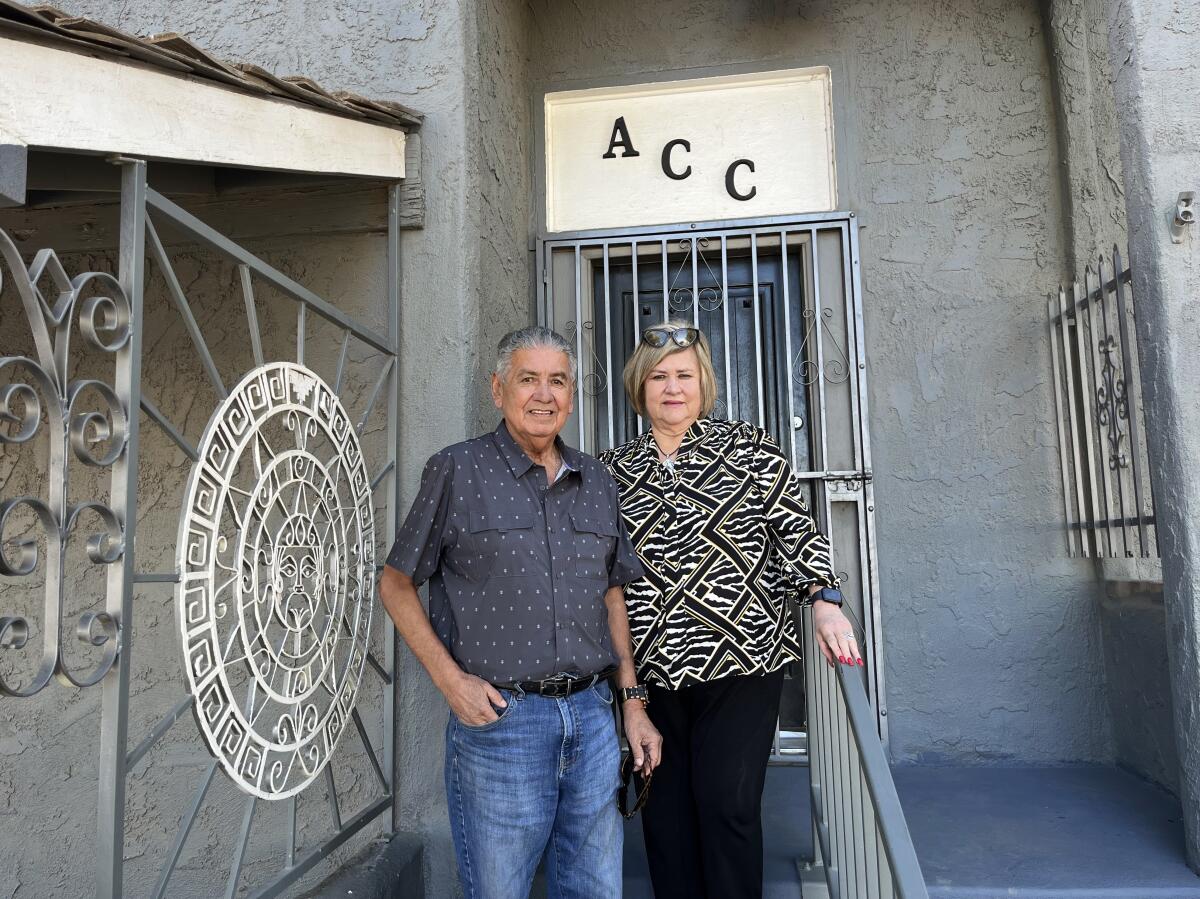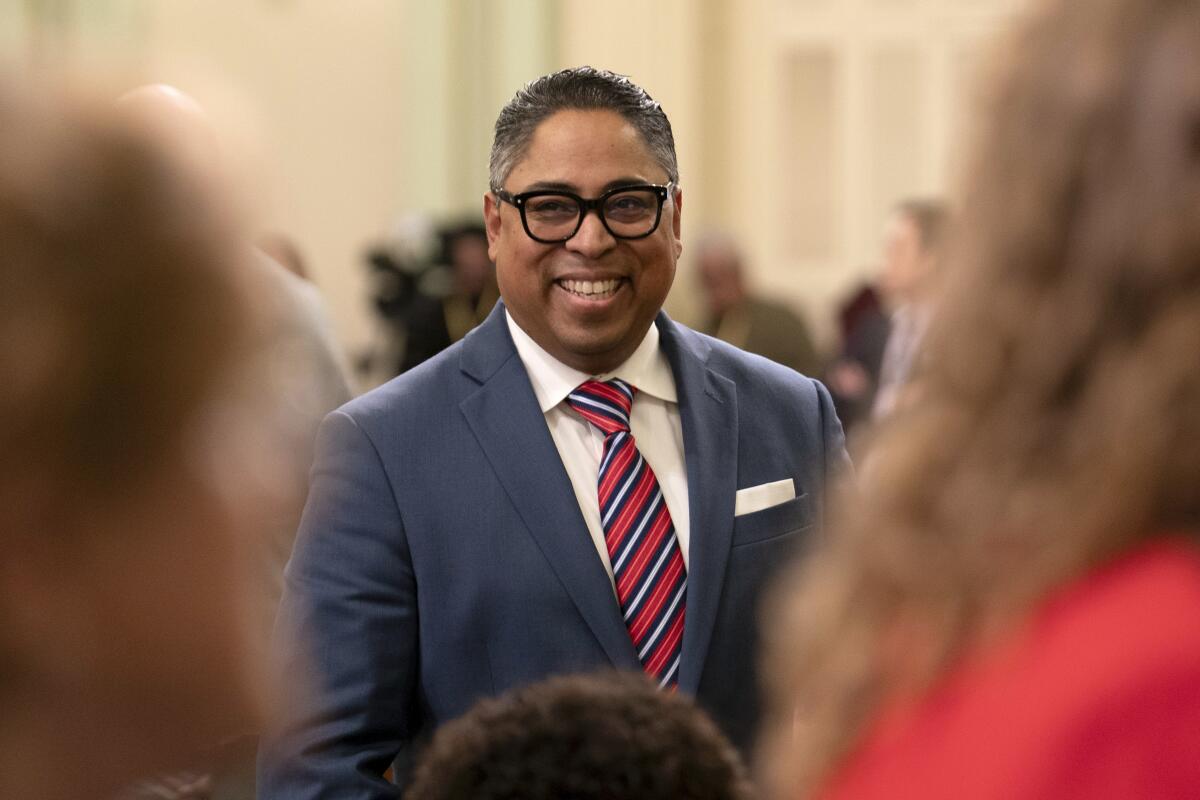This Latino Republican flipped a deep-blue California Assembly district. How?

- Share via
- Republican Jeff Gonzalez won a seat in the Assembly by focusing on the high cost of living and building alliances with Democrats.
- He flipped a rural, mostly Latino district in the Imperial and Coachella valleys, where Democrats hold a nearly 14-point voter registration advantage.
- Gonzalez is one of three Republicans who flipped Democratic seats in the California Legislature this year.
BRAWLEY, Calif. — While Assemblyman Jeff Gonzalez, a newly elected Republican, was taking the oath of office in Sacramento last week, the phones of two supporters in Imperial County pinged with ecstatic updates from his staff about his first day at the Capitol.
There were photos of Gonzalez’s nameplate outside his new office and of his freshly printed business cards. There was even one showing a piece of paper bearing his new letterhead.
The supporters receiving the pictures? Tony Gallegos and his fiancee, Olga Moreno, from El Centro. They are Democrats.
“We ate a little bit of crow in the beginning because here I am, a big Democrat, and [people think] all of a sudden I’ve changed,” said Gallegos, a former chair of the Imperial County Democratic Central Committee. “Well, we didn’t change. We just supported the better candidate.”
By winning his race to represent California Assembly District 36, which borders Mexico and includes a wide swath of the Imperial and Coachella valleys, Gonzalez flipped a rural, mostly Latino district where Democrats hold a nearly 14-point voter registration advantage.
Gonzalez, who wouldn’t say who he voted for in the presidential election, said he was successful because he worked hard to downplay party politics.
He campaigned with prominent local Democrats — including a onetime mayor of Calexico who organized a 2019 protest of former President Trump’s visit to the border that included the infamous, diaper-clad “Trump Baby” balloon — while still appealing to the MAGA Republicans who flocked to the former president’s October rally in Coachella.

“I don’t come here as a Republican,” Gonzalez, of Indio, said in an interview at the Capitol. “Yes, that’s my party, but … I don’t put that title on me. I come here as Jeff, as a community member looking to find a way to work together across the aisle.”
Still, Gonzalez’s victory has excited California Republicans, who hope they can make inroads in this liberal state — especially among voters of color — amid the country’s rightward shift that sent President-elect Donald Trump back to the White House.
Gonzalez, who is of Mexican and Puerto Rican descent, is one of three Republicans — two Latinos and one Asian American — to flip Democrat-held seats in the state Legislature in this election.
He won the seat vacated by Assemblyman Eduardo Garcia, a Coachella Democrat whom he unsuccessfully challenged in the blue-wave year of 2018, losing 35% to 65%.
This year, Gonzalez defeated Democrat Joey Acuña, the president of the Coachella Valley Unified School District board, by 3.6% of the vote. Acuña declined a Times request for comment.
Although Democrats still hold a supermajority in the Legislature, the growing number of Latino Republicans excites Assembly Republican leader James Gallagher of Yuba City.
“I think it’s huge,” Gallagher said. “It represents a realignment. We’re starting to see more and more Latino voters that were loyal Democratic voters and have started to break away from that.”
Assemblywoman Leticia Castillo, a Mexican American Republican who flipped a Democratic district in San Bernardino and Riverside counties, said her focus on “taking back” schools and the economy resonated with voters.
“I found a lot of people would talk about stuff that the Democrats were trying to push on them that they should care for,” Castillo said, referencing topics such as abortion and the new state law banning schools from enacting policies that require teachers to notify parents about changes to a student’s gender identity, including asking to be called by a different name or pronoun.
Voters, she said, made it clear that they “have other issues going on that are more important.”
Gonzalez focused his campaign on the Achilles’ heel of California Democrats: the state’s high cost of living.
In one Instagram video posted in October, Gonzalez stood in front of a gas station in the little desert town of Needles, where a gallon of regular gas cost $5.89. A few miles east, across the Arizona border, a gallon cost $2.95.
“There is no reason why Californians should have to cross state lines in order to make life more affordable,” he said. “Sacramento needs a change.”

For Gonzalez, a 50-year-old Marine Corps veteran who served in Iraq and Afghanistan, cost-of-living issues are personal.
The freshman assemblyman and his wife, Christine, have four adult children, including a 32-year-old son, RJ, who has cerebral palsy with spastic quadriplegia, which means he has epilepsy, cannot use his legs or hands or eat without assistance, and is nonverbal.
“When I married my wife, she had three kids, so I became ‘instapop,’ as I say,” said Gonzalez, who noted that he calls all of them his children and does not use the word “stepchildren” because he raised them.
Gonzalez said he and his wife have battled to get RJ the services he needs.
“It’s expensive to care for someone with severe special needs,” Gonzalez said. “Yes, there are services out there, but that doesn’t always cover everything.”
Last year, they needed a new shower chair for RJ, who had outgrown his old one. Gonzalez said Medi-Cal determined the chair, which can cost more than $1,000, was “a luxury” item that they did not need — but that they qualified for a commode.
“My wife said, ‘A commode? Have you ever taken a bath or shower in your toilet? So why would you ask my son to do the same thing?’” Gonzalez said. After about 10 months, he said, the bath chair was approved.
Watching his wife try to pick up and carry their 150-pound son to the bathroom, he said, prompted him to run for office.
“My son doesn’t have a voice, but I do, and I’m his dad so I’m going to use it,” Gonzalez said. “I thought we were the only ones [with these problems], but on the campaign trail, these underserved communities — it blew my mind.”
Joy Miedecke, president of the East Valley Republican Women Patriots group in the Coachella Valley, said Gonzalez’s personal story of caring for his disabled son resonated with voters on both sides of the aisle.
“When you think about it, a Democrat is probably more likely to support a government program, with people coming to the house,” Miedecke said. “Jeff recognizes that, and that conservatives don’t want to give everything away — but he also recognizes that there are people in need.”
Miedecke, 80, said Gonzalez was smart to spend much of his time on the campaign trail getting Imperial County Democrats on board.
“We celebrated together when Jeff won,” she said. “They were most welcome in our headquarters. Those Democrats, they worked for Jeff with all their hearts because they were ready for something different.”
Gonzalez’s district includes Republican-leaning portions of Riverside and San Bernardino counties, such as French Valley, Desert Palms and Needles.
It also includes all of Imperial County, a longtime Democratic stronghold in the state’s southeast corner that relies heavily upon an agriculture industry whose workforce could be decimated under Trump’s deportation plans and has long struggled with poverty and unemployment.
In Imperial County, the unemployment rate in October was 19.6% — the highest in the state and more than three times the state average, according to the Employment Development Department.
That made Gonzalez’s focus on California’s high prices effective, he and his supporters say.
“These are just working-class folks who came here for whatever reason, from another county or state, and just want to live the California dream,” Gonzalez said. “They’re seeing it go away, and they want someone to stand up for them.”

Imperial County was one of nine counties in California to flip from blue to red in this year’s presidential race. Trump beat Vice President Kamala Harris by 463 votes, becoming the first Republican presidential candidate to win the county since 1988, when voters chose George H.W. Bush.
It is a dramatic shift. In 2020, Imperial County supported Biden by 24.4% of the vote — a roughly 25-point swing with voters choosing Trump this year by 0.8%.
Earlier this year in the county, moderate Democrats in Calexico, an almost entirely Latino border city, led a successful recall campaign against two young, progressive members of the City Council, including its first out transgender member, Raúl Ureña, who accused opponents of transphobia.
Recall leaders — who prominently backed Gonzalez’s campaign — said the recall was not about gender but, rather, about the two ousted councilmembers being out-of-touch and too far-left. The councilmembers, they said, dismissed downtown merchants’ concerns about crime, public drug use and rampant homeless encampments to focus instead on projects like installing charging stations for electric vehicles that most people in town cannot afford.
Kay Pricola, a 77-year-old Republican from Brawley who helped with Gonzalez’s campaign, said she was not surprised by the county’s rightward shift because people are fed up with state Democrats who, she said, have not done enough to bring down costs.
“There’s no financial constraints on the Democratic Party,” Pricola said. “Tax, tax, tax. Everything for everybody, and you don’t have to work for it. ... We’re driving the financially responsible people out of California. Those that are tied to the land, who can’t leave, are going to have a bigger burden, bigger burden, until the point they break. And their children are going to leave.”
Still, given the district’s Democratic tilt, she urged Gonzalez to focus on local issues, telling him: “If you come across as a Trumper, you’re going to turn them off.”
Gallegos, 79, said California Democrats became arrogant, not paying enough attention to the struggling Imperial Valley because it had always voted blue.
“All they want is taxes, taxes, taxes, taxes, taxes — and I’m a Democrat,” he said. “And they’re always asking for money for this and money for that. That’s fine. But what are we going to get out of it? We don’t see it. Look at all the money they put into homelessness, and people are still in the streets.”
Gallegos, who is Mexican American, runs the Brawley American Citizens Club, which his father opened in the 1940s to cater to Latino military veterans who were not allowed to join the local American Legion despite having served in World War II.

Inside the club is a glass display case with a framed thank you letter from former Democratic Gov. Jerry Brown thanking Gallegos for volunteering for his campaign, an invitation to Brown’s 2011 inauguration, and a black-and-white photo of the two men together in 1978.
Nationwide, he said, Democrats seemed to take Latino voters for granted, thinking that “just because we’re Democrats we are going to vote Democrat and let them do whatever they want” but that “it’s changing and the younger generation doesn’t think that way anymore.”
He tends bar at his club and often overhears young people talking over drinks about politics, venting about how much tax money California takes from their paychecks.
Some local Democrats, he and Moreno said, were furious that they supported Gonzalez, arguing that he would have little power in Sacramento as a greatly outnumbered Republican. But the way they see it, Democrats have long had their chance. This year, it was time to try someone new.
Sosa reported from Sacramento, Branson-Potts from Brawley, Calif.












